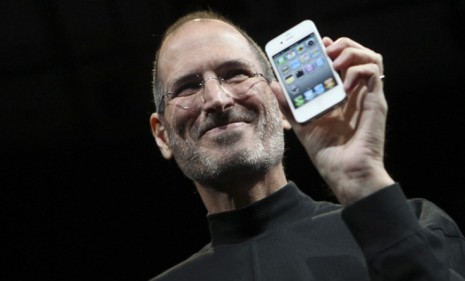Can Apple innovate without Steve Jobs?
The iPhone 4S didn't thrill Apple fans, who worry that Tim Cook and Co. won't be able to wow consumers the same way the incredibly imaginative Jobs did

A free daily email with the biggest news stories of the day – and the best features from TheWeek.com
You are now subscribed
Your newsletter sign-up was successful
Apple's fortunes suffered greatly in the interregnum between Apple founder Steve Jobs being fired in 1985 and returning in 1997. Upon Jobs' return, however, Apple experienced perhaps the greatest corporate comeback in history. Jobs took a near-bankrupt tech has-been and personally oversaw the birth of a $350 billion iEmpire: iMac, iPod, iTunes, iPhone, and iPad. He "told us what we needed before we wanted it," says the AP's Jordan Robertson. Jobs did his best to infuse his philosophy of innovation into Apple's DNA before his death, even creating a secret Apple University for current and future executives. But without its visionary leader, will Apple be able to keep out-innovating its rivals?
Don't bet against Apple: It's perhaps the greatest "back-handed compliment" to Jobs that the stock of rival Asian tech companies rose on the news of his death, says Andrew Hill at Britain's Financial Times, "apparently on doubts about whether the U.S. company would be able to repeat its innovative success without its founder." But "if Jobs' company thrives without him, it won't be an accident." Apple's innovative genius didn't just build iPhones, but also an "insanely great company." Jobs whipped Apple into "a well-drilled army," and detail-oriented new CEO Tim Cook, devoid of Jobs' legendary charisma though he may be, is "the ideal leader for the post-Jobs era."
"Why Jobs' Apple army will march on"
The Week
Escape your echo chamber. Get the facts behind the news, plus analysis from multiple perspectives.

Sign up for The Week's Free Newsletters
From our morning news briefing to a weekly Good News Newsletter, get the best of The Week delivered directly to your inbox.
From our morning news briefing to a weekly Good News Newsletter, get the best of The Week delivered directly to your inbox.
Apple's current crop won't cut it: "Tim Cook is a fine executive, but he's a number-two," says Dana Blankenhorn at Seeking Alpha. He's Jackson Browne to Jobs' Elvis Presley, and Apple doesn't need an Elvis wannabe. To keep ahead of the tech rivals breathing down its neck, Apple needs to hand the reins to a new visionary with a new vision for the next decade — in other words, Apple "needs to find Bruce Springsteen," back when he was in his 20s. "The King is dead. Apple needs a Boss."
Time will tell: "The loss of a founding executive can take years to have an influence for the negative," says Josh Lowensohn at ZDNet. Sure, Cook's widely panned iPhone 4s rollout already has Apple fans nervous, but that's premature. Apple has a deep bench of talented executives, all of whom will fill part of the hole Jobs left. As for the "vision thing," watch design chief Jonathan Ives, who shares Jobs' impeccable taste. We'll see Jobs' touch in the next few Apple products. "What comes after that, only Apple knows."
A free daily email with the biggest news stories of the day – and the best features from TheWeek.com
-
 Can Europe regain its digital sovereignty?
Can Europe regain its digital sovereignty?Today’s Big Question EU is trying to reduce reliance on US Big Tech and cloud computing in face of hostile Donald Trump, but lack of comparable alternatives remains a worry
-
 The Mandelson files: Labour Svengali’s parting gift to Starmer
The Mandelson files: Labour Svengali’s parting gift to StarmerThe Explainer Texts and emails about Mandelson’s appointment as US ambassador could fuel biggest political scandal ‘for a generation’
-
 Magazine printables - February 13, 2026
Magazine printables - February 13, 2026Puzzle and Quizzes Magazine printables - February 13, 2026